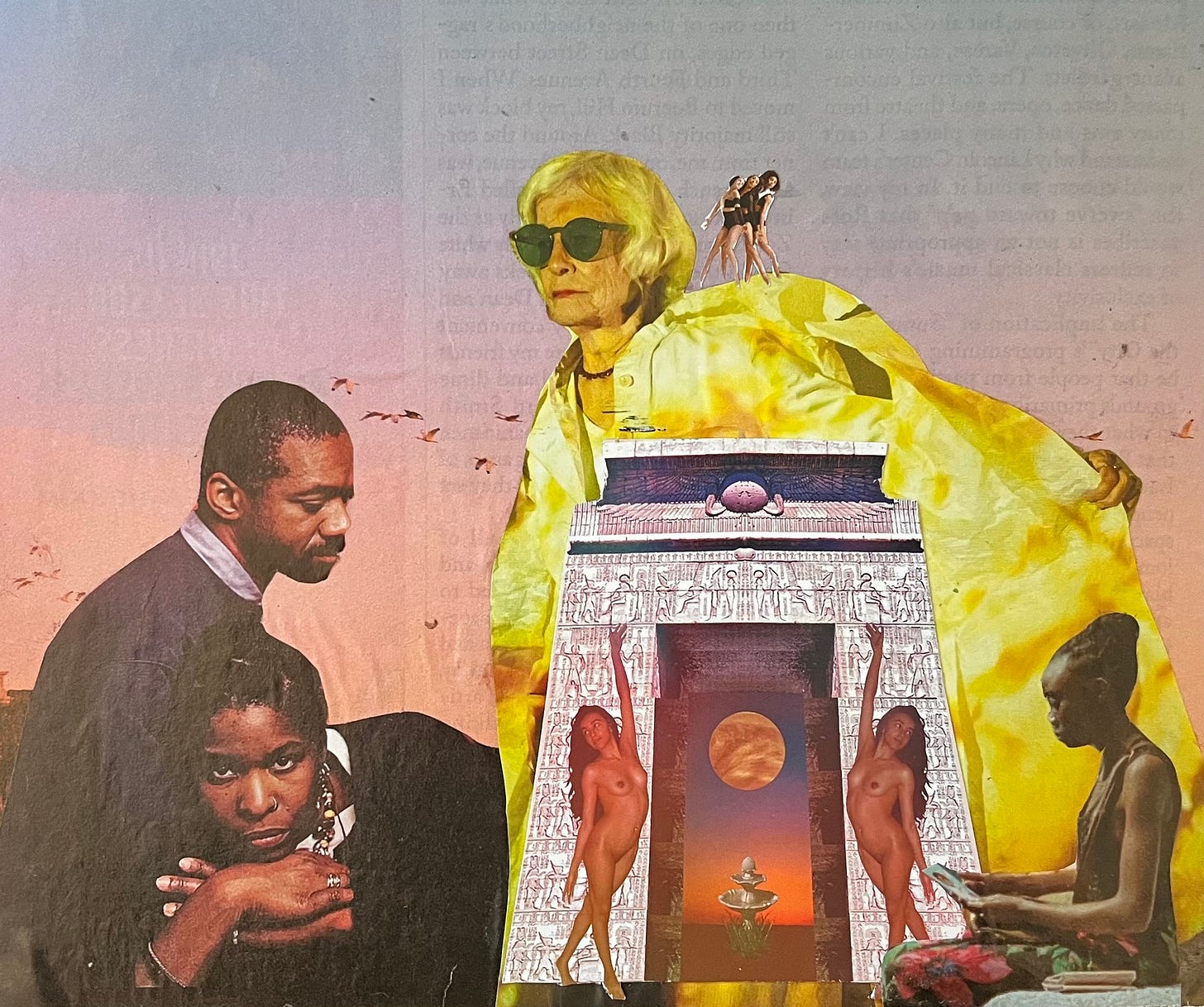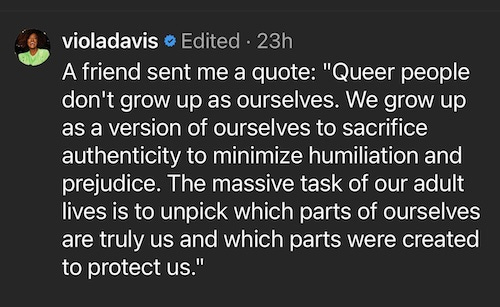
Why, yes, those are 2 separate audio links – 1 below, 1 above. || My reading of this essay is right before the opening Hi friends. 👇🏾 || A guided meditation is at the top of this email. 👆🏾 || An archive of meditations lives here.
All my content on Substack is accessible for all — there is NO paywall here. If you are or can afford to become a paid subscriber, I appreciate your generous financial support — it sustains this work. Thank you to all of you for being readers and for giving me your precious attention — it inspires my writing.
Listen to me read this essay:
Hi friends
How are you? Thank you for being here for this latest lunation. Currently, both our luminaries (Moon & Sun) are in watery, welcoming cancer. Harmonizing Venus too (on their day to boot: Venus = vendredi/viernes). This lunar phase invites our intentions and aspirations. I hope this new moon brings you fresh feelings of initiation and inspiration. As Lucille Clifton said: “We cannot create what we cannot imagine.” May we envision and realize peace and freedom in the beautiful world we all deserve.
I forgot to wish everyone Happy Pride last week. As my wise bestie Peter texted: Here’s to living without shame! 🧚🏾♀️🌈🦄 Yes, please! I’ve been pondering pride and shame, chatting about it with friends, examining these opposing ideas through my preferred prism of the cosmic paradox of belonging — we are not separate AND we are not the same. I will not bury the lede on my perspective, which is this: “Shame” runs on the fuel of degradation. Pride welcomes the beauty of difference. Shame divides. Pride connects. In a world of shame-filled othering, true pride is releasing the delusion of separation for the truth of wholeness within intimacies.
You can see that I started with shame in quotes. Because all this may sound lovely, yet what exactly do we mean when we say shame?
The other day, my friend Brenda and I discussed shaming as a political tactic. As all of us reckon with multiple ongoing global atrocities paid for with our tax dollars, is “shame on you” strategically helpful? Should shaming be directed only at institutions? [Or, duh, because the U.S. government is basically the biggest business, and despite corrupt laws, corporations are in fact not people and cannot feel shame, is this strategy fundamentally ineffective?] Does inducing shame in individuals have any merit?
Recent western research (including, most famously, that of Brené Brown) reasons that, although they’re sometimes used interchangeably, shame and guilt are quite different. Guilt means feeling bad about what we did (or did not do). Shame means feeling bad about ourselves, periodt. In this model, I may say something hurtful and feel appropriately remorseful or guilty, yet when I spiral into feelings of self-abnegation, reprimanding myself for always being so stupid and senseless, I’ve wandered into shame.
In an overculture that worships binaries and avoids paradox, that values independence over interconnection, that promotes uniqueness over unity, that discourages true intimacy, and operates devoid any concept of innate goodness (or the sacred at all), is shame dangerously banishing? In other cultures, can shame serve a skillful purpose exactly because it’s embedded within different values?
For years, I taught a course with my friend Brian Lesage called What Gets Left Out. In it, we explored the babies discarded with the bathwater of many western Buddhist teachings: sacredness, ritual, devotion, nature, cultural expressions, the body, the “feminine,” music/movement, mystery/magic… Brian and I called all this cultural spiritual bypassing. In the 1980’s, with the rise of western appropriation of eastern teachings, Buddhist teacher and psychotherapist John Welwood identified “spiritual bypassing” as unskillfully using a practice to avoid addressing psychological wounds and unresolved personal issues. It describes the learned tendency to use teachings like impermanence and not-self to rationalize prioritizing peaceful states (he called this “premature transcendence”). Without true insight and letting go, the anger or hurt just gets repressed or ignored.
Usually discussed only on this personal/psychological level, Brian and I argued that a spiritual practice can be used to avoid or “bypass” unresolved collective/cultural issues as well. We added the word “cultural” partly to talk about the ways in which we do this with interpersonal and systemic problems, which can be just as painful or charged as, say, anger and sorrow. For example, the distortions created by race are extremely harmful—not just for people of color, but for white people too (though often unconscious). Just as we don’t want to feel our personal pain, whether it’s depression or backache, we also often avoid touching into the pain of oppression and injustice. We then manipulate teachings such as non-attachment or emptiness to justify avoiding what’s right in front of us.
In that course, we shared an article by scholar Joseph Cheah where he explores a study by Victor Sogen Hori, a Canadian Rinzai priest and academic professor, about the varying experiences of western and Chinese meditators on the same meditation retreat. He says this (emphasis my own):
“White retreatants uniformly expressed that a week of intense meditation gave them the strength to cope with the pressures of everyday life and assisted them with the process of self-realization. Chinese Buddhists, on the other hand, expressed that the retreat helped them to get in touch with their feelings of shame and repentance for failing to live up to their respective roles within their families. Hori attributed these distinctive reactions to two different understandings of self: the Western notion of the person as an autonomous individual, and the Eastern concept of the person as the nexus of social relations... Hori thus brings out at a deeper structural level how Buddhist concepts such as anatta have been rearticulated via meditation to affirm the Western notion of the autonomous self. In this example, what rearticulation reveals is that whiteness operates in such an inconspicuous manner that white Buddhists and sympathizers may knowingly use Eastern meditation techniques to realize Western notion of person as an autonomous self, on the one hand, and not realizing that they are using white Buddhism to express dominant cultural values, on the other.”
There’s a lot in this paragraph (and if you’re interested in the role of “cultural rearticulation” in modern meditation, including within “engaged Buddhism,” I recommend reading the entire article), but what I’d like to emphasize here is the dynamic between self concepts of a person as the nexus of social relations versus as an autonomous individual, especially, whether these two ideas are mutually exclusive or not. Can they exist within an ever-emergent, continually-generative relationship to self and other? Not either/or but both/and. Interconnection and Individuality. Sacred and Social. Unity and Uniqueness. Not Separate and Not the Same.
Without an understanding of our sacred interconnectedness, shaming easily leads to social banishment. Cancel culture could only manifest in this hyper-secular, super-individuated, and over-isolating modernity. At the same time, for centuries, connectivity exaggerated into conformity has and continues to preach a shame that denies the truth and beauty of authenticity. Pride requires boldness and bravery in spaces where violence looms over those expressing their truths.
For years, I carried shame as a constant companion. In You Belong, I wrote about holding the shame of an immigrant African kid surrounded by whiteness. I neither physically nor culturally mirrored what was heralded in magazines or media — eating funny food, wearing the wrong clothes, etc. I subsequently reached for the whiteness offered in mainstream achievements of school and work — although my innate rebelliousness (and weirdness) prevented a complete capitulation to the dominant culture. I’m not saying I did not try to fit in, but I would only go so far. I bought Gloria Vanderbilt jeans and Izod shirts (albeit with imperfections and on discount at Marshall’s), but would never relax my hair. I excelled in math & science in high school, but majored in religious and women’s studies in college. I graduated from a “good” university, but tripped on acid for sixteen hours after my very last exam. I strived to belong, but strained to maintain my autonomy. Normal marked both the goalpost and signaled defeat. I was never average enough nor cool enough. Shame bridged the chasm between assimilation and authenticity. I’ve fiiled it with so many shames: shame of illness, shame of debt, shame of loneliness, shame of aging, shame of shame… Now, sharing myself in my teaching and writing helps me fill the gap shame once occupied. Perhaps the opposite of bypassing is intimacy.
After my marriage collapsed two years ago, I said I would not be discussing dating here. I lied. [Essays on divorce feeling like both failure & freedom and the dance between shame & pride within singlehood could be serialized here for many, many moons…] I’m still not going to talk about any individuals I date. However, this inquiry around pride and shame actually emerged because in this moment I’m accidentally poly, back on an app, and trying to understand how to label my sexuality in relation to all those I want to date.
Many years ago, I was in a workshop where I was paired with a non-binary, queer millenial to process a social identities activity. In conversation with them, I named that although I’d been with women in my twenties, I identify as straight. My workshop partner challenged me, implying that I was betraying a larger queer community by not labeling myself as such. As a Gen Xer, I had a different perspective (and I’ve since corroborated this view with others of my generation). This may be a bit of an exaggeration (but not by much): See kids, way back in the olden days, it felt like appropriation to claim anything but a straight identity unless one was “fully” gay or lesbian (bisexuals were treated as confused, pansexual was not on offer, and the heteroflexible category of OK Cupid had yet to be coded).
I admit now, that it’s also been convenient for me not to claim anything but a straight identity because of shame — I never told my mom I had previously dated the woman I brought home for a visit that time. Most of my straight friends are exclusively so. I’ve never named this inquiry publicly until right now, with all of you.

I still am very careful not to assume an identity that does not feel like “mine.” I aspire to understand what this truly means. I also want to live without any shame – for who I was then, am now, and becoming. As my friend Nina said to me the other day, “You may not be queer, but you’re definitely not straight.”
I linked last week to this conversation between filmmaker Ira Sachs and writer Rachel Cusk where he eloquently states the intimacy of realness:
“In a way, I’m only interested in the real. And real meaning to me is the intimate—I have to change real to intimate. So, capturing intimacy in a space and among a group of people is really important to me, capturing how we are in relation to other people, whether it be in a bedroom, or a nightclub, or a car, or a restaurant, each of those. But the question is, How do you create intimacy? How do you access the real? You work so much from self and self-experience that the real challenge is language. And for me, it’s actually enactment.”
As I said before, I really do need to make myself a t-shirt of this, but I want it to say “I’m only interested in the really intimate.”
Happy Pride, y’all.
With love,
Sebene












Share this post